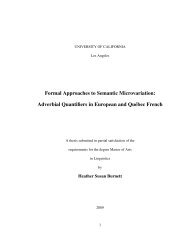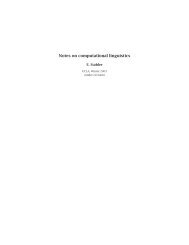Post Verbal Subjects and Agreement in Brazilian Portuguese
Post Verbal Subjects and Agreement in Brazilian Portuguese
Post Verbal Subjects and Agreement in Brazilian Portuguese
You also want an ePaper? Increase the reach of your titles
YUMPU automatically turns print PDFs into web optimized ePapers that Google loves.
cases is translated with the English expletive there. Note that <strong>in</strong> st<strong>and</strong>ard English,<br />
the verb agrees with the associate <strong>in</strong> constructions <strong>in</strong>volv<strong>in</strong>g this expletive: 11<br />
(62) There are/*is some cats <strong>in</strong> the garden.<br />
This contrasts with the French existentials, where agreement is always third<br />
person s<strong>in</strong>gular: 12<br />
(63) Il y a/ *ont des chats dans le jard<strong>in</strong>.<br />
it there has/ have of cats <strong>in</strong> the garden<br />
‘There are cats <strong>in</strong> the garden.’<br />
In BP, either third person s<strong>in</strong>gular agreement or agreement with the<br />
associate subject is possible. I propose that BP has both an expletive like French il<br />
(pro-il) <strong>and</strong> an expletive like English there (pro-there).<br />
Pro-there will be assumed to orig<strong>in</strong>ate <strong>in</strong>side the small clause (e.g., see<br />
Hazout (2004)) 13 , as a predicate (as <strong>in</strong> Moro (1993, 1997)) which copies the phi-<br />
features of its argument while <strong>in</strong> the small clause through agreement (as suggested<br />
<strong>in</strong> Koopman’s (2006)).<br />
Pro-il on the other h<strong>and</strong> will be assumed to be a clausal pronoun which can<br />
pronom<strong>in</strong>alizes the small clause. The idea that an expletive pronoun can<br />
pronom<strong>in</strong>alize a clause is present <strong>in</strong> Rosenbaum’s (1967) discussion of<br />
11 This seems to be true ma<strong>in</strong>ly <strong>in</strong> formal st<strong>and</strong>ard English. The use of there’s for both plural <strong>and</strong><br />
s<strong>in</strong>gular is very common <strong>in</strong> spoken English. See Schutze (2003) for some discussion.<br />
12 Smith Isl<strong>and</strong> English behaves similarly to French:<br />
(i) I don't know how many it is/*are there now. (Parrott, 2001)<br />
13 Though, Hazout, differently from Moro <strong>and</strong> the analysis <strong>in</strong> this thesis, takes the expletive to be a<br />
possible subject of the small clause.<br />
20

















